Sorting out your stomach pain
Our experts can help you sort out the cause of your stomach pain.
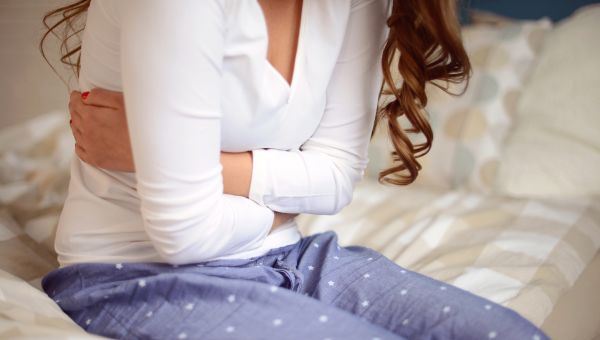
We’ve all experienced abdominal discomfort in some form or another, and we all know how frustrating it can be trying to figure out what’s causing that rumbling and grumbling. Was it simply something you ate, or could it be the sign of a more serious digestive condition? Before you start to worry, let us help you sort out your stomach pain with some help from our top experts.
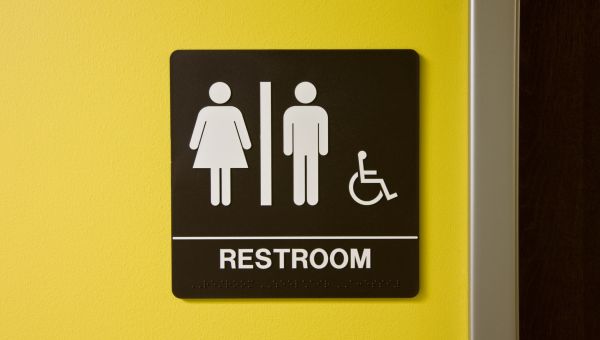
IBS vs. Diverticulitis
Does your stomach pain feel more like cramping?
If the pain occurs sporadically, down in the lower part of your belly, and is relieved by frequent trips to the restroom, it could be a sign of irritable bowel syndrome, or IBS. IBS is a digestive disorder that causes abdominal pain, gassiness and a… Show More
Does your stomach pain feel more like cramping?
If the pain occurs sporadically, down in the lower part of your belly, and is relieved by frequent trips to the restroom, it could be a sign of irritable bowel syndrome, or IBS. IBS is a digestive disorder that causes abdominal pain, gassiness and a change in bowel movements. Eating tend to trigger it, so treatment often includes diet and lifestyle changes, although medication is sometimes prescribed to help alleviate symptoms.
Show Less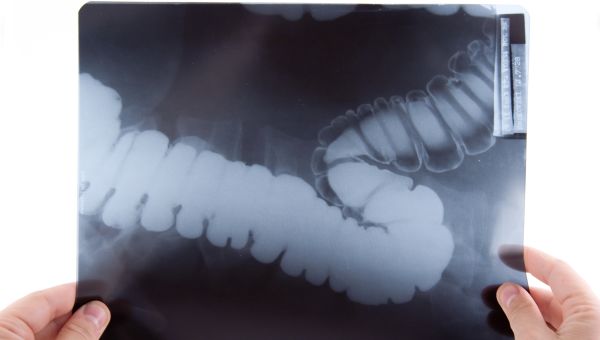
Diverticulitis
IBS can sometimes be confused with diverticulitis. It causes similar lower abdominal pain, and the same sense of gassiness and bloating that occurs with IBS. The difference? Diverticulitis is an infection that comes on suddenly, caused by inflammation in pouches called diverticula that form on the… Show More
IBS can sometimes be confused with diverticulitis. It causes similar lower abdominal pain, and the same sense of gassiness and bloating that occurs with IBS. The difference? Diverticulitis is an infection that comes on suddenly, caused by inflammation in pouches called diverticula that form on the walls of the colon. If you have a fever, chills and abdominal tenderness, you may have diverticulitis.
“Under most circumstances now, because we have better antibiotics, we treat most patients with antibiotics and they go home,” says Joseph Thornton, MD, of Sunrise Hospital & Medical Center in Las Vegas, NV. In rare cases, it can cause more serious complications.
Show Less
Heartburn vs. Stomach Ulcer
If you’re tempted to dismiss heartburn as a potential cause of your stomach pain, not so fast. The acid and food regurgitation that occurs with heartburn can actually cause pain in the upper part of the belly. To determine if your pain is a symptom of acid reflux, look for it to occur with a… Show More
If you’re tempted to dismiss heartburn as a potential cause of your stomach pain, not so fast. The acid and food regurgitation that occurs with heartburn can actually cause pain in the upper part of the belly. To determine if your pain is a symptom of acid reflux, look for it to occur with a burning in the throat, chest pain, burping or a sour taste in the mouth.
If your goes heartburn goes untreated or becomes chronic GERD, it can cause more serious health problems according to Francis Teng, MD, of MountainView Hospital in Las Vegas, NV. “Over time, heartburn can lead to a lot of conditions,,” [including] “damaging the esophagus…affecting the patient’s ability to swallow.”
Show Less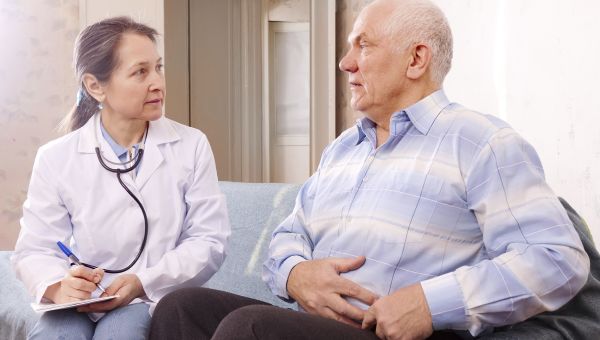
Stomach Ulcer
A stomach ulcer is a sore in the lining of your stomach, small intestines or lower esophagus that’s usually caused by the H. pylori bacteria or heavy use of over-the-counter pain medications such as ibuprofen or aspirin.
Because they cause a similar burning sensation, stomach ulcers can sometimes… Show More
A stomach ulcer is a sore in the lining of your stomach, small intestines or lower esophagus that’s usually caused by the H. pylori bacteria or heavy use of over-the-counter pain medications such as ibuprofen or aspirin.
Because they cause a similar burning sensation, stomach ulcers can sometimes get misdiagnosed as GERD. The difference though, is that stomach ulcers will cause pain in the upper part of your abdomen, between your breastbone and belly button, when your stomach is empty, instead of right after eating.
Doctors can determine if ulcers are the culprit of your stomach pain by testing for the presence of H. pylori or taking a special x-ray of your GI tract.
Show Less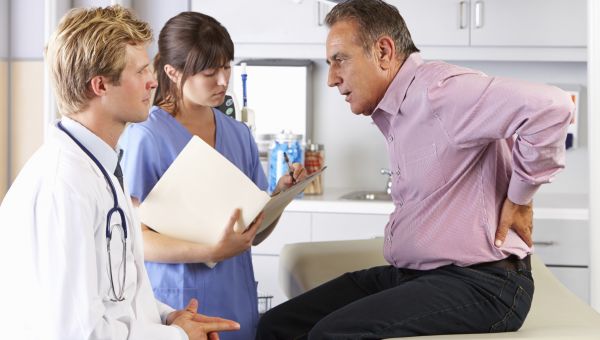
Kidney Stone vs. Appendicitis
Anyone who’s experienced kidney stones can tell you that they’re no laughing matter. Sharp pangs in the lower part of your back and abdomen can last from a few minutes to a few days.
Jayram Krishnan, DO, of Sunrise Hospital and Medical Center in Las Vegas, NV, explains, “Typically, kidney stones… Show More
Anyone who’s experienced kidney stones can tell you that they’re no laughing matter. Sharp pangs in the lower part of your back and abdomen can last from a few minutes to a few days.
Jayram Krishnan, DO, of Sunrise Hospital and Medical Center in Las Vegas, NV, explains, “Typically, kidney stones are formed in patients that don’t drink enough water.” This lack of water causes minerals to concentrate in the urine, forming a stone. In addition to debilitating stomach pain, the stones can also cause nausea and vomiting. If your doctor determines you have kidney stones, he or she may prescribe medication, recommend drinking fluids or perform shock wave lithotripsy.
Show Less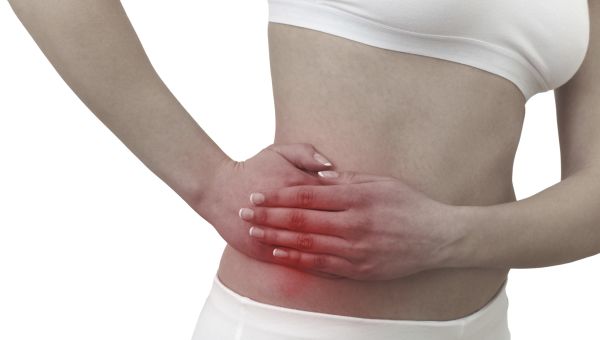
Appendicitis
Kidney stones and appendicitis share several symptoms, such as nausea and sharp, lower abdominal pain – but mixing up these two conditions could be dangerous. Appendicitis is a severe condition that can require emergency care, so be aware of these signs: a minor or sudden pain that begins in the… Show More
Kidney stones and appendicitis share several symptoms, such as nausea and sharp, lower abdominal pain – but mixing up these two conditions could be dangerous. Appendicitis is a severe condition that can require emergency care, so be aware of these signs: a minor or sudden pain that begins in the upper abdomen, then travels down to the right side and gets more severe and gets worse over the course of 6-24 hours; also abdominal tenderness, fever, constipation or diarrhea and frequent urination. If these symptoms last more than four hours, it’s important to seek out immediate medical care.
Show Less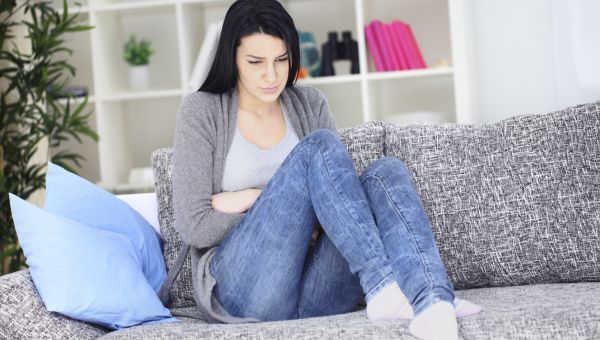
Menstrual Cramps vs. Endometriosis
Are you experiencing dull, throbbing pain that sits in the lower part of the pelvis, or a radiating backache and pain in the upper thighs? If these sound familiar to you, it’s probably because you recognize them as symptoms of menstrual cramps.
Cramping is caused by prostaglandins — chemicals that… Show More
Are you experiencing dull, throbbing pain that sits in the lower part of the pelvis, or a radiating backache and pain in the upper thighs? If these sound familiar to you, it’s probably because you recognize them as symptoms of menstrual cramps.
Cramping is caused by prostaglandins — chemicals that tell your uterus to contract and shed its lining. The more your body produces, the more intense your cramping. In addition to mild to severe abdominal pain, you may also experience bloating, nausea, diarrhea and fatigue. Most women can get relief from period pain by taking an anti-inflammatory like ibuprofen or using a heating pad.
Show Less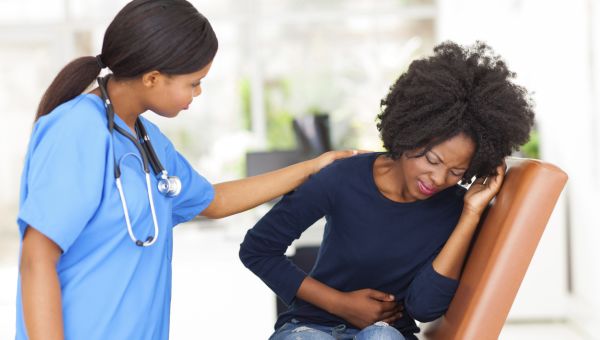
Endometriosis
Menstrual pain that’s more intense, occurs during sex, becomes chronic and isn’t relieved by OTC medications or a heating pad could be the sign of endometriosis.
Unlike typical period pain, endometriosis pain is sharp and severe, occurring several days before your period and lasting throughout the… Show More
Menstrual pain that’s more intense, occurs during sex, becomes chronic and isn’t relieved by OTC medications or a heating pad could be the sign of endometriosis.
Unlike typical period pain, endometriosis pain is sharp and severe, occurring several days before your period and lasting throughout the duration of your cycle. While the cause is still unknown, experts believe it could be the result of genetics, your immune system not effectively getting rid of endometrial cells or hormonal problems.
Show Less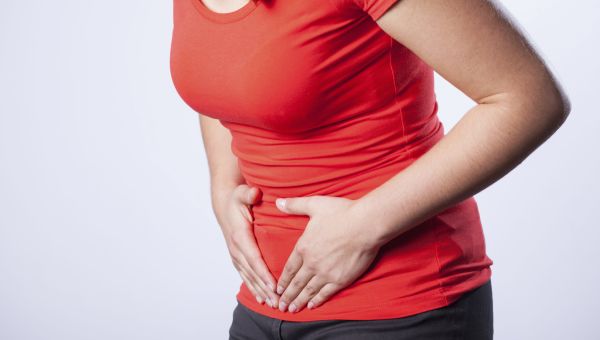
Uterine Fibroids vs. Ovarian Cysts
According to Edmond Pack, MD, of Southern Hills Hospital in Las Vegas, NV, "Fibroids are benign tumors that grow within the muscle of the uterus." Usually, they're asymptomatic, but in some women, fibroids can cause uncomfortable symptoms such as heavy menstrual cycles, pelvic pain and pressure,… Show More
According to Edmond Pack, MD, of Southern Hills Hospital in Las Vegas, NV, "Fibroids are benign tumors that grow within the muscle of the uterus." Usually, they're asymptomatic, but in some women, fibroids can cause uncomfortable symptoms such as heavy menstrual cycles, pelvic pain and pressure, cramping and frequent urination. Up to 75% of women will experience them in their lifetime.
If you think your abdominal pain could be the result of uterine fibroids, mention it to your OB/GYN. He or she will usually be able to diagnose your pain with a routine pelvic exam and offer you a few different options for treatment, including medication and hysterectomy, depending on your symptoms.
Show Less
Ovarian Cysts
Like fibroids, ovarian cysts can be asymptomatic, or, depending on their size, cause abdominal pain, frequent urination and changes to your menstrual cycle. Ovarian cysts are usually benign (functional), but in rare cases can be cancer.
Unlike fibroids, these cysts can cause pressure in the… Show More
Like fibroids, ovarian cysts can be asymptomatic, or, depending on their size, cause abdominal pain, frequent urination and changes to your menstrual cycle. Ovarian cysts are usually benign (functional), but in rare cases can be cancer.
Unlike fibroids, these cysts can cause pressure in the abdomen on the side of the cyst, plus breast tenderness and weight gain.
Determining if an ovarian cyst is causing your abdominal pain requires a trip to your gynecologist, where they will perform a pelvic exam. Because the symptoms of these cysts are so similar to other conditions, make sure to report any unusual pelvic symptoms, such as sudden pain or bleeding, to your doctor during the exam.
Show Less
Is It Time to See a Doctor?
Even when you break down the symptoms, diagnosing the cause of your abdominal pain can be difficult. Make sure you’re communicating to your doctor all of your symptoms – when and where they occur, how often and if they’ve changed over time. The more information your physician has, the better care… Show More
Even when you break down the symptoms, diagnosing the cause of your abdominal pain can be difficult. Make sure you’re communicating to your doctor all of your symptoms – when and where they occur, how often and if they’ve changed over time. The more information your physician has, the better care you’ll receive for your pain.
And when in doubt, have it checked out. If the pain you’re experiencing is persistent or debilitating, make an appointment with your doctor. If your abdominal pain is sudden and severe, take a trip to the emergency room, as it could be a sign of a more serious condition.
Show Less